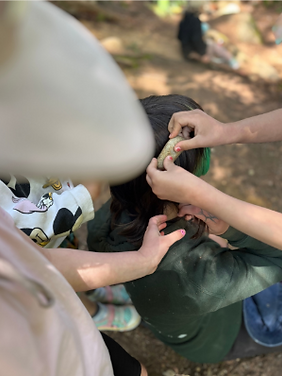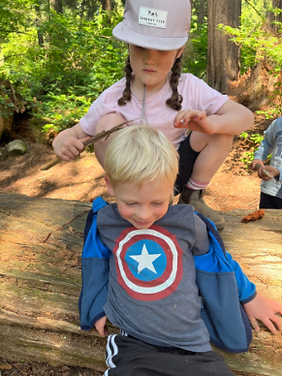Dramatic Play and Deepening Conversations around Gender Stereotypes
Dramatic play at Pemberton Heights fosters creativity, emotional growth, and inclusion by allowing children to explore roles, challenge stereotypes, and build social connections through imaginative, child-led experiences.
By Shannon Emery, ECE


Dramatic play is a central part of our days at Pemberton Heights. From interactive storytelling and family role-play to Gruffalo hunts, space adventures, and fishing games, our learners immerse themselves in imaginative worlds daily.
We know how essential dramatic play is in early childhood. It offers children opportunities to:
-
Explore new roles and identities
-
Work through emotions in a safe, supported way
-
Strengthen language, creativity, and problem-solving skills
-
Build social-emotional understanding through negotiation, boundary setting, and collaboration
Recently, we’ve noticed a shift toward more self-initiated dramatic play. Reflecting on what may have sparked this, one moment stood out.


While walking to the forest, we passed a “free items” sign outside a home. Among the offerings was a plastic doll salon set, complete with hair tools. Although we didn’t take it (in part due to our preference for natural, open-ended materials), the brief encounter clearly left an impression. Within days, salon-themed play began to unfold in the forest—without a single plastic prop.
One morning, a group invited Grace: “Come over to the salon!” They mimicked curling her hair using sticks, untangled it with pinecones, and carved out personal “workstations” on the forest floor. We wondered aloud with them—What’s the salon called? Do we need to book an appointment? What’s the going rate for a haircut?
Then, a moment of exclusion surfaced when a student told a peer, “You can’t join, you’re a boy.” Rather than correct this directly, we responded with curiosity:
“What makes you say that?”
“Do hairstyles have a gender?”
“Can anyone run a salon?”
Together, we unpacked the assumption that gender defines roles or interests. The group quickly agreed—anyone could join the salon, regardless of gender. A simple, gentle challenge to a stereotype opened space for inclusion.



Later, the play expanded to include both Teacher Shannon and Teacher Soroush. Laughter erupted—perhaps from the fun of the activity, or maybe surprise at seeing a male educator engaging in beauty-themed play, an area often culturally coded as “feminine.” While we didn’t get to explore that particular thread, the experience reminded us how dramatic play can surface important social questions and open doors to shift perspectives.
At its best, dramatic play isn’t just about fun—it’s a powerful pedagogical tool. It nurtures creativity, deepens relationships, and creates safe, meaningful opportunities to explore identity, challenge norms, and build inclusive communities.


